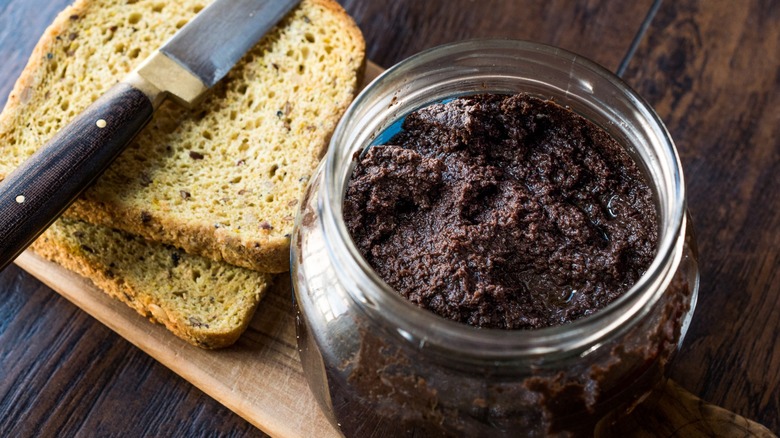The Best Way To Store Jarred Tapenade So It Stays Fresh
Tapenade, that delectable olive-based spread hailing from the scenic landscapes of Provence, France, has become a beloved staple in many households. Whether spread on crunchy bread, stirred into pasta, or used as a topping, this savory mixture promises a burst of flavor with every bite. However, as with any culinary delight, the key to enjoying its fresh flavors lies not just in how it's prepared but also in how it's stored.
Proper storage is also necessary for health and safety reasons. The spread, vibrant and delish as it is, can quickly become a breeding ground for unwanted microbes if not properly kept. Thankfully, an unopened jar, given its commercial sealing and the presence of preservatives, offers a decent shelf life when stored right.
To ensure it's longevity keep it in a cool, dry place away from direct sunlight, like a pantry or a cupboard. This way, your jar can last for six months or more. Refrigerating an unopened jar of tapenade isn't a must, though there's no harm in it. On the other hand, once opened, the olive spread must be refrigerated, as recommended by USDA, and this is when the process of storing and preserving its freshness becomes more intricate.
Refrigerate opened jars for continued freshness
Once the seal of a tapenade jar is broken, the fridge becomes its new home. The low temperatures effectively slow down any activity of microorganisms that could otherwise spoil your spread. Any opened jar of store-bought tapenade in the refrigerator should be consumed within two weeks for the best quality. Homemade versions might have a shorter lifespan, usually around seven days, due to the absence of commercial preservatives.
Either way, always make sure the jar is tightly sealed in an airtight container before returning it to the fridge, otherwise, the tapenade should be used within three days. To go the extra mile in preserving your spread, you can also layer a small amount of olive oil on top of it inside the jar. The oil acts as a barrier against air, which can oxidize the olives and affect the flavor.
If you find yourself with a large quantity of tapenade that you don't foresee using immediately, consider freezing it. Freezing it in air-tight portioned containers can extend its life for up to three months. Lastly, always be mindful of the expiration date, especially with store-bought tapenade. In any case, no matter the storage conditions of your olive-based spread, if you ever notice an off smell, mold, or questionable change in texture, it's better to be safe and discard it.

